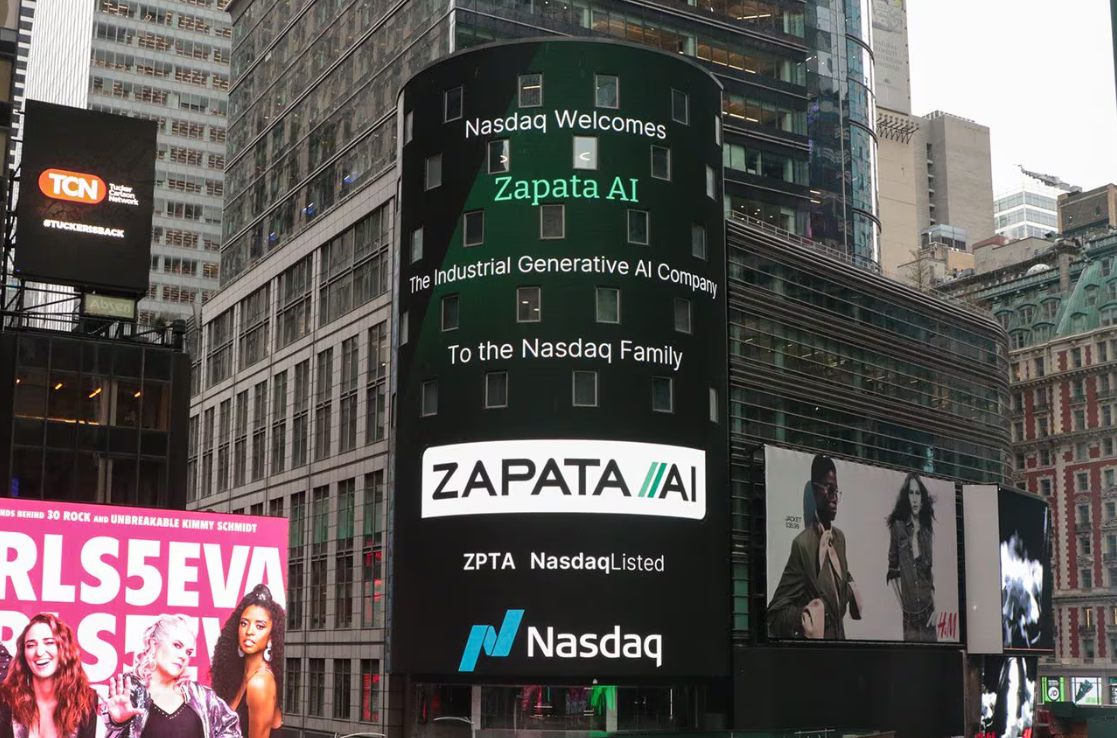量子计算、生成式人工智能,哈佛初创公司 Zapata 公开了所有流行语

【中美创新时报2024 年 4 月 3 日波士顿讯】(记者温友平编译)波士顿量子计算初创公司萨帕塔计算(Zapata Computing)通过与一家空白支票公司合并而上市。本周,该公司的股票开始在纳斯达克交易,这在平静的 IPO 市场中是一项引人注目的壮举。《波士顿环球报》记者亚伦·普雷斯曼(Aaron Pressman)对此作了下述报道。
Zapata Computering 是 2017 年哈佛大学一项研究成果的延伸,其想法是为即将到来的基于量子力学原理的新机器浪潮编写软件。
虽然量子计算硬件仍在开发中,但这家总部位于波士顿的初创公司已经将其软件应用于当前计算机的一些问题,包括生成人工智能的热门领域。本周,该公司的股票开始在纳斯达克交易,这在平静的 IPO 市场中是一项引人注目的壮举。
首席执行官克里斯托弗·萨瓦(Christopher Savoie)解释说,量子计算长期以来一直专注于解决物理、金融和其他需要同时计算许多变量的领域的问题。
萨瓦说,在生成人工智能方面,“我们能够非常快速地提出利用量子物理学的算法和方法。 ……这意味着我们可以做得更快、更快、更好。”
去年,这一做法显示出足够的前景,可以吸引安德烈蒂(Andrettis)赛车家族支持的空白支票公司的投资。 Zapata Computer 也以 Zapata AI 名义开展业务,与 Andrettis 的特殊目的收购公司合并,并于周一开始在纳斯达克交易,代码为 ZPTA。
其他一些量子计算初创公司已经通过与 SPAC 合并而上市,在投资者等待原型转变为商业产品的不耐烦之后,大多数公司的股价暴跌。例如,自 2022 年 8 月完成 SPAC 交易以来,D-Wave Quantum 的股价下跌了 80% 以上。
萨帕塔的软件可以比陷入困境的量子硬件制造商更快地带来收入。为量子计算机设计的算法也可以在 Nvidia 等公司的当前图形处理单元或 GPU 上运行,尽管比在量子计算机上运行的速度慢。Zapata 拥有约 75 名员工,已经签约了一些客户。宝马正在使用该软件来优化制造计划,西班牙银行 BBVA 正在模拟市场走势以进行风险管理。
IDC 分析师希瑟·韦斯特 (Heather West) 表示:“正如其他量子计算初创公司所证明的那样,通过 SPAC 成为一家上市公司可能会提供快速融资,但它也有其缺点。” “但是如果 Zapata AI 不同呢? ……明年将会清楚地说明到底发生了什么。”
上市还有助于吸引银行和政府等受监管行业的客户(萨帕塔已经拥有一些国防合同)。萨瓦说:“当你试图与这类公司和机构进行采购时,作为一家上市公司所拥有的透明度和审查实际上是一件非常积极的事情。”
该公司以著名的墨西哥革命家埃米利亚诺·萨帕塔 (Emiliano Zapata) 的名字命名。早在 2017 年,萨瓦就与他的联合创始人、当时的哈佛大学教授艾伦·阿斯普鲁-古兹克 (Alán Aspuru-Guzik) 讨论创办这家公司,后来他搬到了多伦多大学。在哈佛广场的边境咖啡馆,在萨帕塔的照片下吃饭,两人受到了启发。
“我们想要一个革命性的名字,”萨瓦回忆道,并补充说这个名字在多种语言中听起来都很好。 “所有这些量子公司的名字中都有一个‘q’。 …我们想与整个‘q’的事情有点相反。”
Forrester 分析师布赖恩·霍普金斯 (Brian Hopkins) 表示,这种相反的情况,加上 Zapata 软件优先的方法,已经在金融、生命科学和物流领域“显示出希望”。他说,与当今为 ChatGPT 和其他应用程序提供支持的大型语言模型相比,使用量子技术进行生成人工智能可以实现更紧凑、更快速的模型。
霍普金斯说,在当今的计算机上运行 Zapata 软件,“好事会变得更好”,并补充说,未来量子计算机可以“呈指数级加速人工智能系统的能力”。
在萨帕塔上市的第一天,该股股价大幅下跌,就像 SPAC 交易经常发生的情况一样。该股收盘价为 5.70 美元,萨帕塔队的股票市值为 1.37 亿美元。
“从长远来看,最重要的是我们的收入、收益和增长——这些才是我们真正关心的事情,”萨瓦说。“我们处于一个非常重要的领域,具有巨大的长期影响。是的,现在人工智能领域有一些炒作。但我相信这是一个长期的繁荣。人工智能不会消失。”
题图:波士顿量子计算初创公司 ZapataComputing 通过与一家空白支票公司合并而上市。ZAPATACOMPUTING
附原英文报道:
Quantum computing. Generative AI. Harvard startup Zapata goes public with all the buzzwords.
By Aaron Pressman Globe Staff,Updated April 2, 2024
Zapata Computing spun out of a research effort at Harvard in 2017 with the idea of writing software for a coming wave of new machines based on the principles of quantum mechanics.
While quantum computing hardware is still in development, the Boston-based startup has been applying its software to some problems using current computers, including the red-hot area of generative artificial intelligence. This week, the company’s stock started trading on the Nasdaq, a notable feat in a quiet market for IPOs.
Chief executive Christopher Savoie explained that quantum computing has long been focused on solving problems in physics, finance, and other areas that require calculating many variables at the same time.
In generative AI, Savoie said, “we were able to very quickly come up with algorithms and approaches that take advantage of quantum physics. … It means we can do it quicker, faster, better.”
The approach showed enough promise to attract investment from a blank-check company backed by the Andretti auto racing family last year. Zapata Computing, which also does business as Zapata AI, merged with the Andrettis’ special purpose acquisition company and began trading on the Nasdaq under the symbol ZPTA on Monday.
AI for MBAs? One Harvard Business School lecturer is giving it a shot.
A handful of other quantum computing startups have gone public by merging with SPACs and most saw their stock prices tumble after investors grew impatient waiting for prototypes to turn into commercial products. Shares of D-Wave Quantum, for example, lost more than 80 percent since the company completed its SPAC deal in August 2022.
Zapata’s software could bring in revenue more quickly than struggling quantum hardware makers. Algorithms designed for quantum computers can also run on current graphics processing units, or GPUs, from companies such as Nvidia, albeit more slowly than they’d run on a quantum computer. Zapata, which employs about 75 people, has already signed up a few customers. BMW is using the software to optimize manufacturing schedules, and Spanish bank BBVA is simulating market movements for risk management.
“As other quantum computing startups have demonstrated, becoming a publicly traded company via a SPAC may provide quick funding, but it also comes with its disadvantages,” IDC analyst Heather West said. “But what if Zapata AI is different. … The next year will provide clarity as to what is really happening.”
Going public also could help attract customers in regulated industries such as banking and government (Zapata already has a few defense contracts). “The transparency and scrutiny that you have as a public company is actually very much a positive thing when you’re trying to go through procurement with those kinds of companies and institutions,” Savoie said.
The company is named after the famed Mexican revolutionary Emiliano Zapata. Back in 2017, Savoie was talking about starting the company with Alán Aspuru-Guzik, his cofounder and a Harvard professor at the time who has since moved to the University of Toronto. Eating at the Border Café in Harvard Square under a picture of Zapata, the pair grew inspired.
“We wanted a revolutionary name,” Savoie recalled, adding that the name sounded good in multiple languages. “And all these quantum companies, they all had a ‘q’ in their name. … We wanted to be a little bit contrary to the whole ‘q’ thing.”
That contrariness, with Zapata’s software-first approach, is already “showing promise” in finance, life sciences, and logistics, Forrester analyst Brian Hopkins said. Using quantum techniques for generative AI could allow for more compact and speedier models than today’s large language models that power ChatGPT and other applications, he said.
Running Zapata software on today’s computers, “good things will get somewhat better,” Hopkins said, adding that in the future quantum computers could “exponentially accelerate the capabilities of AI systems.”
On Zapata’s first day of trading, the stock took a big dip, as often happens with SPAC deals. The shares closed at $5.70, giving the Zapata a stock market value of $137 million.
“What is going to matter in the long term are our revenues and our earnings and our growth — those are the things that we’re really concerned with,” Savoie said. “And we’re in a really important sector that has large long-term implications. Yeah, there’s some hype in AI right now. But I believe that this is a long boom. AI is not going away.”

